Are you looking for ways to support your heart health naturally?
With the right supplements, you can enhance your cardiovascular wellness and maintain a healthy lifestyle.
Heart-healthy supplements can provide essential nutrients and antioxidants needed for optimal heart function. This means you can focus on healthier lives with more energy and less worry about heart-related issues.
Snap Supplements offers a range of products specifically designed to support heart health. From gummies to powders, these supplements combine modern science with natural ingredients for optimal results. Options like our Heart Beets Capsules can boost energy and promote healthy blood flow, helping you feel your best daily.
$25.00
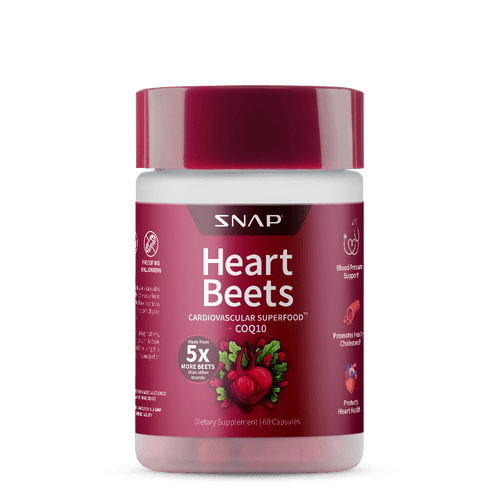
Heart Beets Capsules
$29.00
Choosing the right supplement can be a game-changer in maintaining cardiovascular health. You can nourish your body more effectively with carefully selected botanicals and superfoods.
Whether you’re interested in improving blood flow, energy, or overall heart function, we have solutions tailored to fit your needs.
In this blog, you’ll learn:
-
The vital role of heart health in overall well-being.
-
The key nutrients and supplements that can support cardiovascular function.
-
How incorporating these supplements into your daily routine can enhance energy, blood flow, and heart health.
Understanding Heart Health
Maintaining heart health is vital for a long, healthy life. Supplements can be key in supporting cardiovascular health, and assessing risk factors is essential.
The Role of Supplements in Cardiovascular Support
Supplements can be beneficial for a heart-healthy lifestyle.
Nutrients like omega-3 fatty acids, CoQ10, and magnesium are known to support heart function.
-
Omega-3s in fish oil help help soothe inflammatory symptoms and improve cholesterol levels.
-
CoQ10, an antioxidant, aids energy production in heart cells and may benefit those on statins.
-
Meanwhile, magnesium supports normal heart rhythm and muscle function.
By incorporating botanicals and other heart-supportive nutrients, their supplements help optimize cardiovascular wellness.
Assessing Heart Health and Risk Factors
Monitoring heart health involves understanding your risk factors.
Some key measures include checking blood pressure, cholesterol levels, and body mass index (BMI). High blood pressure or cholesterol can increase the risk of heart disease. Family history, lifestyle choices, and pre-existing conditions also affect heart health.
Regular check-ups with your healthcare provider can help track these metrics. Maintaining a balanced diet and exercising regularly are important to managing these risk factors.
$34.00
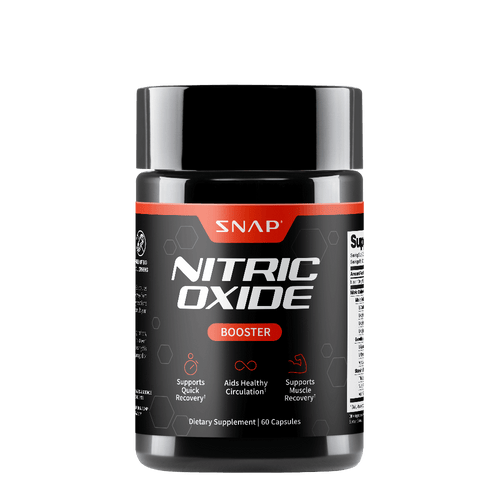
Booster d'oxyde nitrique (60 ct)
$40.00
Key Heart-Healthy Supplements
Supplements can play a significant role in supporting heart health. Each key nutrient contributes uniquely to cardiovascular function. Exploring how Omega-3 fatty acids, Coenzyme Q10, magnesium, and antioxidants benefit your heart is essential for a healthy lifestyle.
Coenzyme Q10 and Its Impact on Cardiac Energy
Coenzyme Q10 (CoQ10) is essential for heart energy production. It acts as an antioxidant, protecting your cells from damage.
CoQ10 helps convert nutrients into energy, which is critical for heart cells that work nonstop to pump blood throughout the body. It is naturally present in the body but diminishes with age, so a supplement may be beneficial for maintaining optimum levels.
For those taking statins for cholesterol management, CoQ10 might counteract the muscle pain side effects sometimes associated with these medications. Using supplements like those from Snap Supplements could support your heart’s energy needs.
$49.00
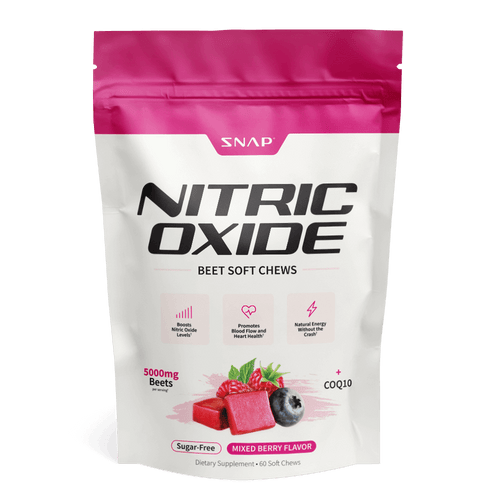
Bonbons mous à la betterave et à l'oxyde nitrique
$57.00
Magnesium: Electrolyte Balance and Heart Rhythms
Magnesium is vital for maintaining normal heart rhythms. It also plays a crucial role in electrolyte balance, which is necessary for proper muscle and nerve functions.
Inadequate magnesium can lead to irregular heartbeats, known as arrhythmias. Magnesium can also help support healthy blood pressure by relaxing blood vessels, reducing strain on your heart. Foods high in magnesium include leafy greens, nuts, and whole grains.
Supplementing with magnesium can be especially beneficial if your diet lacks this mineral. Maintaining adequate magnesium levels can help ensure your heart continues to function efficiently.
$31.00
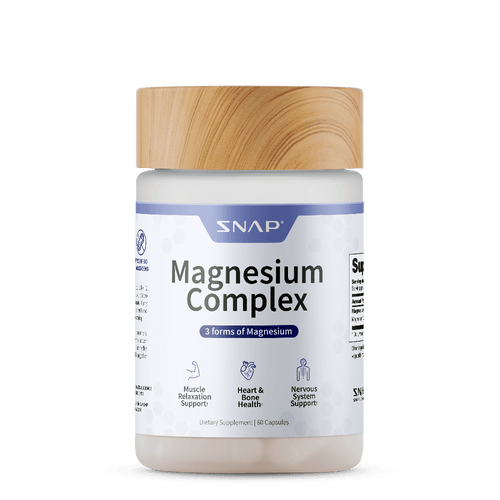
Complexe de magnésium
$36.00
Antioxidants: Combatting Oxidative Stress
Antioxidants are powerful substances that help protect your heart from oxidative stress, which can lead to inflammation and heart disease. Common antioxidants include vitamins C and E and compounds like flavonoids.
These nutrients work by neutralizing harmful free radicals, thus preventing cellular damage. Antioxidant-rich foods like fruits, vegetables, and whole grains can support heart health by improving blood vessel function and reducing inflammation.
Boosting your antioxidant intake through supplements may strengthen your defenses against cardiovascular issues. Consider products that focus on natural ingredients to bolster your heart’s resilience against oxidative stress.
$49.00
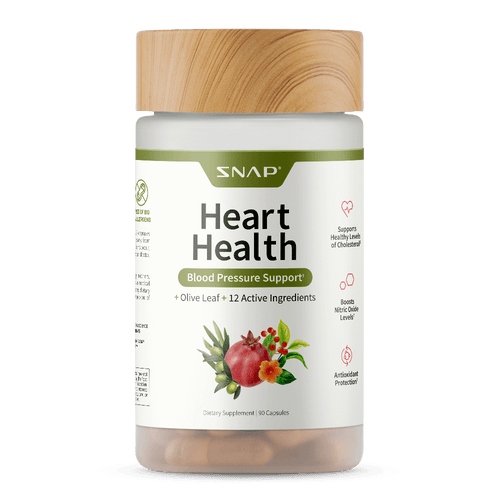
Santé cardiaque
$57.00
Omega-3 Fatty Acids: Benefits for Heart Function
Omega-3 fatty acids are known for supporting heart health. These essential fats help help soothe inflammatory symptoms, lowering the risk of heart disease.
Incorporating Omega-3s can help lower triglycerides, a type of fat found in your blood that, at high levels, may increase heart disease risk. They also help keep blood vessels flexible and support healthy blood pressure. You can find Omega-3s in fish, certain plant oils, and specific supplements.
Their anti-inflammatory properties may also help prevent arterial plaque buildup. Including Omega-3-rich foods or supplements may support healthier heart rhythms and lower the likelihood of heart-related issues.
Herbal Supplements for Cardiovascular Health
When considering herbal supplements for heart health, hawthorn extract, and garlic are two options that stand out. These supplements are notable for their potential roles in managing blood pressure and cholesterol levels, which are critical cardiovascular health factors.
Hawthorn Extract and Blood Pressure Regulation
Hawthorn extract is a popular herbal supplement that may help support healthy blood pressure.
The hawthorn plant's berries, leaves, and flowers contain compounds like flavonoids, which can improve blood circulation and decrease blood vessel tightness. This can assist in keeping blood pressure within a healthy range.
Clinical studies have shown that hawthorn extract can potentially lower both systolic and diastolic blood pressure. This makes it a valuable option for those looking to support their cardiovascular system naturally. By encouraging better blood flow, hawthorn also supports overall heart function.
Taking hawthorn extract as part of your wellness routine could aid in maintaining healthy blood pressure levels. It’s often available in capsules, tinctures, or teas. Though generally safe, it’s important to consider consulting a healthcare provider, especially if you’re on other medications for blood pressure control.
Garlic and Cholesterol Management
Garlic is another effective herbal supplement renowned for its role in cholesterol management. The active compound in garlic, allicin, is thought to help reduce LDL cholesterol levels, which is often associated with an increased risk of heart disease.
Research suggests that consuming garlic can lead to modest reductions in cholesterol levels and might also help prevent cholesterol oxidation in the bloodstream. This reaction is crucial because oxidized cholesterol can lead to plaque buildup in arteries.
Incorporating garlic into your diet through supplements may offer cardiovascular benefits. These supplements are easy to find, often available as capsules or powders. Remember that garlic can interact with other medications, so consulting with your doctor is advisable when adding it to your regimen.
{recommended_product_7}
Vitamins and Mineral Support
Incorporating the right vitamins and minerals into your daily routine can significantly impact your heart health—key nutrients like vitamin D and potassium are essential in maintaining cardiovascular function and stability.
Vitamin D and Its Role in Heart Function
Vitamin D is crucial for maintaining heart health.
It helps support healthy blood pressure and supports arterial function. Adequate vitamin D levels can lower the risk of heart disease by reducing inflammation and improving overall cardiovascular function.
A lack of vitamin D might lead to an increased risk of heart issues.
Potassium’s Importance in Cardiovascular Health
Potassium is vital for maintaining normal heart function. It helps regulate the heartbeat and ensures muscles, including the heart, work correctly.
Adequate potassium intake can prevent high blood pressure and decrease the risk of stroke. Foods rich in potassium, such as bananas and spinach, are excellent dietary sources. Alternatively, supplements like Organic Heart Beets from Snap Supplements can conveniently boost your potassium intake.
Prioritizing potassium is an effective strategy for supporting heart health and overall well-being.
Incorporating Supplements into Your Diet
Incorporating heart-healthy supplements can enhance cardiovascular wellness, especially when considering the right dosage and potential interactions with other substances. Being mindful of how you integrate these supplements can make a significant difference in their effectiveness and your overall health.
Lifestyle Considerations and Heart Health
Making healthy lifestyle choices can significantly improve your heart health. Regular physical activity, nutritious dietary habits, and effective stress management are essential in maintaining cardiovascular well-being.
Exercise and Cardiovascular Strength
Regular exercise is vital for a healthy heart.
Aerobic exercises like walking, cycling, or swimming can strengthen your heart by improving blood circulation and reducing blood pressure.
Aim for at least 150 minutes of moderate aerobic activity per week. Strength training is also beneficial. It helps build muscle mass and improve metabolic health. Include lifting weights or using resistance bands two to three times a week.
Consistency is the key to reaping the full benefits.
Dietary Choices and Their Influence
A balanced diet can significantly affect your heart’s health.
Focus on consuming whole grains, fruits, and vegetables. These foods are rich in fiber, vitamins, and minerals that support cardiovascular health.
Limit your intake of saturated fats, salt, and processed sugars, which can contribute to heart disease. Omega-3 fatty acids, found in fish like salmon, are beneficial. We offer products that include essential nutrients and botanicals, which can aid in maintaining a healthy heart when paired with a balanced diet.
Stress Management Techniques
Effective stress management can lead to better heart health.
Chronic stress may increase inflammation in the body, contributing to heart disease. To manage stress effectively, practice techniques such as meditation, deep breathing exercises, or yoga.
Find hobbies or activities that relax and engage you. Connecting with supportive friends or family members is also crucial.
Consulting Healthcare Professionals
Before exploring heart-healthy supplements, consider consulting healthcare professionals for guidance tailored to your needs. Personalized advice from physicians ensures that any supplement plan aligns with your health requirements and conditions.
Working with Physicians for Personalized Advice
Your healthcare provider can help you understand which supplements fit your health profile.
They assess your overall condition and any medications you take, which helps avoid unwanted interactions. For instance, supplementing may affect medication, so professional input is crucial.
Personalized advice means considering diet, lifestyle, and specific health goals. Discuss with them any supplements you're considering, such as the Heart Beets Stick Packs, which contain beneficial beetroot for heart health. This collaboration helps create a balanced, effective plan that considers all aspects of your health.
Remember, your physician's insights are invaluable in ensuring safe and beneficial choices.
Monitoring Progress and Outcomes
To ensure the effectiveness of heart-health supplements, track key health metrics and adjust supplement use as needed. Use personal health data and adjust your routine based on results.
Tracking Health Metrics and Adjusting Supplement Use
Track metrics like blood pressure, cholesterol levels, and heart rate regularly.
Keep a journal to record these and any noticeable changes in your daily activities or overall wellness. Monitoring these details helps you see how your heart health is progressing.
Consider using supplements like those from Snap Supplements, which offer natural ingredients like superfoods and minerals. If your data indicates improvement, you may continue with your current regimen. If not, consider adjusting your dosage or trying different products.
Always consult your healthcare provider before making changes to your supplement routine.
Frequently Asked Questions
When it comes to supporting your heart health, many people have questions. Understanding the right supplements, dosage, and how they fit into your overall routine can be a bit overwhelming. Let’s clear up some common queries and give you the clarity you need to make informed decisions.
What supplements are recommended for improving heart health?
Some common supplements include omega-3 fatty acids, CoQ10, and magnesium. These support your heart by promoting healthy blood flow and reducing inflammation.
Which vitamins support cardiovascular function and circulation?
Vitamins like B6, B12, and folic acid are key in reducing homocysteine levels, which can improve circulation. Vitamin D also contributes to heart health to support healthy blood pressure.
Can CoQ10 be beneficial for heart health, according to cardiologists?
Cardiologists often recommend CoQ10 because it helps produce energy in cells and may improve heart function. It is particularly beneficial for those taking statin medications, which can lower CoQ10 levels in the body.
How do particular supplements aid in arterial health?
Supplements like nitric oxide, often found in beets, can improve arterial health by widening blood vessels. This promotes better blood flow and reduces blood pressure, benefiting heart health.
What are the best options for managing heart palpitations with supplements?
Magnesium and potassium are essential for regulating heart rhythm. These supplements can help manage palpitations by ensuring proper electrical activity in the heart.
Are there effective supplements for strengthening the cardiovascular system?
Snap Supplements offers products rich in antioxidants and other active compounds. These may strengthen your cardiovascular system by supporting healthy arteries and reducing oxidative stress.